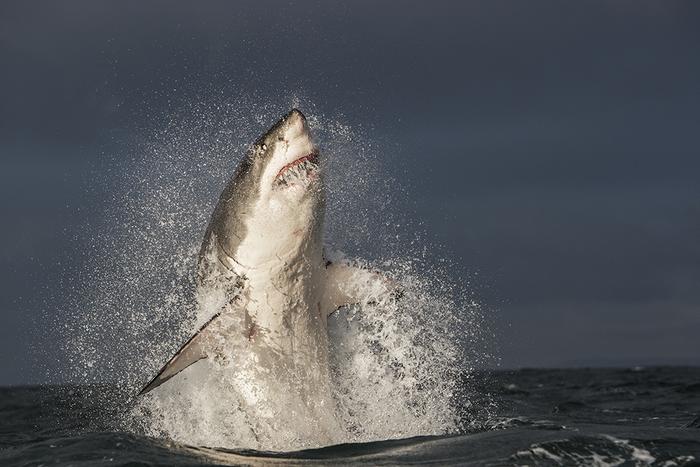The ecosystem of False Bay, South Africa, has been facing alarming changes following the marked decline of its once-abundant Great white shark population. Recent research conducted over two decades by scientists at the University of Miami’s Rosenstiel School of Marine, Atmospheric, and Earth Science has illuminated the essential role that these apex predators play in maintaining the delicate balance of marine ecosystems. The implications of their disappearance extend well beyond the immediate loss of these iconic creatures, revealing a cascade of ecological disturbances that threaten the health of the entire oceanic environment.
Great white sharks, with their formidable hunting skills, are not just significant predators; they are key players in the intricate web of marine life. Historically, False Bay was bustling with these powerful sharks, but their numbers have dramatically dwindled, leading to widespread concern among conservationists and scientists alike. Recent evidence suggests that a combination of factors, including decades of overfishing, unsustainable captures in protective nets, and predation by Orcas, have contributed to their alarming decline.
As the Great white sharks have vanished, an observable shift within the marine food web has occurred. The loss of these apex predators has sparked a substantial increase in the population of Cape fur seals and sevengill sharks, both of which rely on similar food sources. This population spike has triggered subsequent declines in the fish species that the seals prey upon and in the smaller shark species that sevengills consume, demonstrating the ripple effects that can ensue from the removal of a top predator.
The research findings detailed the dramatic shifts in the ecosystem that have emerged in the absence of Great white sharks. These changes reflect ecological theories about food web dynamics and highlight the essential nature of top-down predation pressure for maintaining the health and stability of marine environments. Through rigorous analyses that involved long-term boat-based surveys, citizen science observations, and the innovative use of Baited Remote Underwater Video Surveys (BRUVS), the researchers were able to document these cascading effects and their implications for the local ecosystem.
Lead author Neil Hammerschlag underscores the profound changes unfolding in False Bay: "The loss of this iconic apex predator has led to an increase in sightings of Cape fur seals and sevengill sharks, which in turn has coincided with a decline in the species that they rely on for food.” His words reflect the urgency of the situation, as the intricate balance of the marine food web teeters on the brink of instability.
Hammerschlag’s insights are reinforced by the observations of co-author Yakira Herskowitz, who noted the distinct behavioral changes seen in fish species under the looming threat posed by predators. The underwater video surveys, conducted both before and after the Great white sharks’ decline, revealed that species often become more elusive in the face of heightened predation risk, further complicating assessments of their population dynamics.
The ensuing shifts signify a pressing need for reevaluating conservation strategies aimed at protecting apex predators like the Great white shark. The implications go beyond the local fisheries and biodiversity; they echo across global marine ecosystems that depend on the health of top predators for sustaining diverse marine life. As apex predators influence the dynamics of prey populations, their loss can lead to significant, often irreversible, shifts in the structure and function of marine ecosystems.
With oceans playing a critical role in global food supply, recreation, and myriad ecosystem services, understanding the importance of maintaining predator-prey dynamics has never been more essential. The collapse of iconic species not only threatens local biodiversity but poses a broader risk to ocean health and the well-being of communities reliant on marine resources.
Furthermore, the need for global conservation measures is underscored by the findings of this study. Scientists stress that the results should serve as a rallying call to protect apex predators not just in South Africa but around the globe. The delicate balance within oceans necessitates a proactive, informed approach to conservation that recognizes the interconnectedness of all marine species. The ripple effects resulting from the loss of apex predators like the Great white shark could reverberate through generations, with consequences that may well outstrip our current understanding of marine ecology.
Science has repeatedly shown that preserving biodiversity is crucial for ecosystem resilience. As this study reveals, the loss of Great white sharks comes with alarming consequences that reach into the depths of marine food webs and the livelihoods of communities dependent on healthy oceans. The crash of one species is often the catalyst for broader ecological upheaval, emphasizing the importance of maintaining not just the species themselves but the intricate relationships they uphold within their ecosystems.
In summary, the alarming decline of Great white sharks in False Bay reflects a broader narrative about the fate of apex predators worldwide. The findings from the University of Miami’s research team provide an essential perspective into the cascading effects of their loss, affirming the importance of conservation efforts. The consequences of inaction are urgent and potentially devastating; thus, it is imperative that we facilitate sustainable practices that protect these essential creatures and maintain the health of our oceans for future generations.
Through ongoing research, awareness, and commitment to marine conservation, we can strive to reverse the trends of decline and work towards restoring balance in the marine ecosystems we often take for granted. The path forward is clear: protecting apex predators like the Great white shark is not just about preserving a species; it is about ensuring the resilience and health of our oceans as a whole.
Subject of Research: Animals
Article Title: Evidence of cascading ecosystem effects following the loss of white sharks from False Bay, South Africa
News Publication Date: March 25, 2025
Web References: Frontiers in Marine Science
References: DOI: 10.3389/fmars.2025.1530362
Image Credits: Chris Fallows, Apex Shark Expeditions
Keywords: Great white sharks, False Bay, ecosystem disruption, marine conservation, apex predators, biodiversity.




